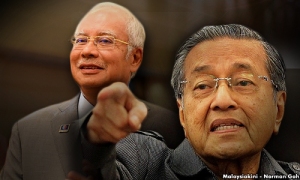by John Berthelsen@www.asiasentinel.com
Malaysia’s central bank (Bank Negara Malaysia) is clearly losing the battle to defend its national currency, the Ringgit, which fell to RM4.2275 to US$1 on August 24 before recovering slightly on the bank’s buying, with the pace accelerating as the international financial community continues to lose confidence in the country’s deteriorating economic position and its massive twin financial scandals.
Events over the weekend did little to inspire confidence, with the Police arresting 29 protesters before they could even start a rally and charging them with Section 124 of the Penal Code, a nebulously worded amendment that deals with “activities detrimental to parliamentary democracy” and carries penalties up to 20 years in prison.
The electoral-reform group Bersih has called for mass street protests in Kuala Lumpur, Kuching and Kota Kinabalu on August 29 and 30. Police have vowed to stop the rally and jail its organizers. The harsh penalties leveled at the protesters over the past weekend may have been aimed at frightening next week’s participants.
Union Bank of Switzerland (UBS) issues currency alert
The Swiss bank UBS last Friday, Aug. 21, issued an alert saying the magnitude and speed of the currency’s decline “exceeded our bearish expectations,” falling 24 percent against the US dollar over the past year and bringing the rate to a 17-year low. But although UBS set a short-term target of 4.35, privately UBS bankers are saying the currency could go to RM5.0:US$1 just this week. It shot through the psychologically important barrier of 4:1 last week without a hitch.
With international reserves having fallen to US$94.5 billion as of August. 15, Bank Negara has few tools to stop the slide. Bank Negara Governor, Zeti Akhtar Aziz last week ruled out currency controls, leaving her only the weapon of raising interest rates, which would play havoc with the economy, given high household and government debt. With crude oil and other commodity prices sliding, GDP growth fell to a still-respectable 4.9 percent for the second quarter.
The Kuala Lumpur stock market has headed for collapse as well, falling by 12.7 percent since August 3 and 2.17 percent today alone. Although all Asian markets have been descending in line with China’s crashing bourses, the KLSE is the worst-performing market in Asia and looks set to get worse. Foreigners have been bailing out of the market, the currency and foreign direct investment, with FDI plummeting by 41.8% to RM21.3 billion in the first half of 2015, although officials said the sharp fall was due to a high base year in the first half of 2014.
Throw it away
Prime Minister Najib Razak is seemingly willing to wreck almost every government institution in his bid to stay in power in the face of a widespread effort by the opposition and members of his own party to oust him over two massive scandals, one a US$681 million “donation” from unnamed Middle Eastern interests into his personal account, supposedly in gratitude for fighting ISIS. However, US$650 million was spirited back out of the account in 2013 to another Najib personal account in Singapore – then disappeared out of that account to somewhere else, raising more questions than it answered.
The second is his stewardship of 1Malaysia Development Bhd., a state-backed investment fund which, according to critics, has US$6.6 billion worth of unfunded liabilities that a revolving door of chief executive officers and accounting firms have been unable to explain. The Sarawak Report, edited from the UK by Clare Rewcastle Brown, alleged that hundreds of millions of dollars have been diverted to accounts in Singapore and elsewhere held by the young Penang-born tycoon Jho Taek Low, who was instrumental in persuading Najib to establish the fund.
Unity Coalition Seeking No Confidence vote?
However, despite desperate attempts to contain the scandals by sacking or neutralizing a long list of officials involved in investigating them, there are indications that they are escaping into the wider global financial sphere. On August 26, Switzerland’s financial regulator FINMA announced that it is investigating the extent of any involvement which its banks may have had in any of the alleged ‘dubious’ transactions linked to 1MDB. At least half a dozen banks including Falcon Private Bank, BSI of Lugano, JP Morgan and Coutts & Co have been named elsewhere as involved. Singapore authorities have also said they are investigating accounts connected to 1MDB.
Over the weekend, it appeared that the opposition Pakatan Rakyat coalition’s three component parties might be willing to at least discuss the possibility of teaming up with former Prime Minister Mahathir Mohamad, Najib’s severest domestic critic, to seek a vote of no confidence in the Parliament. Mahathir is insisting that the ruling Barisan Nasional lead any unity government. Lim Kit Siang, the Democratic Action Party parliamentary leader, said that the idea might be worth discussing.
For Mahathir to team up with Lim would be a surprise. But earlier this month he agreed to meet with longtime foe Tengku Razaleigh Hamzah, who tried to oust him in the 1980s and failed, nearly destroying UMNO in the process. A vote of confidence would first have to get by the parliamentary speaker, who is a close ally of the Prime Minister’s.
Perhaps anticipating such a challenge, over the weekend Najib set out to play the race card, telling a United Malays National Organization assembly that Malays and Muslims would be ‘bastardized’ if UMNO is ousted from ruling the government as a part of the Barisan Nasional coalition. The leaders of the challenge against him are almost all ethnic Malays, including Mahathir, Razaleigh, fired deputy prime minister Muhyiddin Yassin and others.
Fear tactics by Najib
“Some people say that the Malays will be defeated, beaten or fall flat on the ground but I choose the word ‘bastardize,’ Najib was quoted in local media as saying – a veiled reference to the possibility that ethnic Chinese would dominate the political process as well as the economy.
He and other officials have also charged that unnamed foreigners are also out to wreck Malaysia’s parliamentary democracy. The United States’ two leading newspapers, the Wall Street Journal and the New York Times, have both carried extensive, deeply detailed stories describing both the 1MDB shenanigans and the Najib family’s personal wealth including expensive properties in New York and California. Najib has threatened to sue the Wall Street Journal for its reports, but has stalled on actually issuing a demand for retraction. His counsel’s latest ploy was to say he would seek advice from “other countries” on the feasibility of suing. That has been met with derision.
The Sarawak Report has been a particular source of irritation, with a constant drumbeat of entries describing family and governmental misdoings. The government has charged Rewcastle Brown with sedition and sought to have her extradited from the UK, which is regarded as nonsensical grandstanding for a domestic audience.





No comments:
Post a Comment
Note: Only a member of this blog may post a comment.